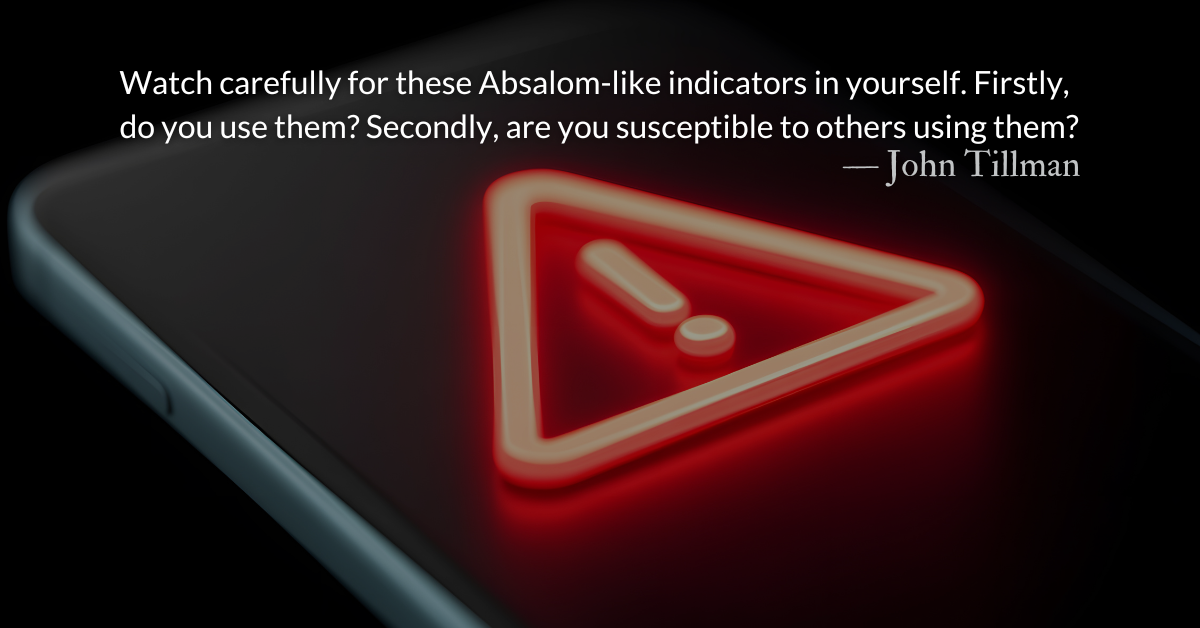Links for today’s readings:
Read: 2 Samuel 15 Listen: (6:06) Read: Psalms 1-2 Listen: (2:05)
Links for this weekend’s readings:
Read: 2 Samuel 16 Listen: (4:03) Read: Psalms 3-4 Listen: (1:57)
Read: 2 Samuel 17 Listen: (5:00) Read: Psalms 5-6 Listen: (2:45)
Scripture Focus: 2 Samuel 15.2-6
2 He would get up early and stand by the side of the road leading to the city gate. Whenever anyone came with a complaint to be placed before the king for a decision, Absalom would call out to him, “What town are you from?” He would answer, “Your servant is from one of the tribes of Israel.” 3 Then Absalom would say to him, “Look, your claims are valid and proper, but there is no representative of the king to hear you.” 4 And Absalom would add, “If only I were appointed judge in the land! Then everyone who has a complaint or case could come to me and I would see that they receive justice.” 5 Also, whenever anyone approached him to bow down before him, Absalom would reach out his hand, take hold of him and kiss him. 6 Absalom behaved in this way toward all the Israelites who came to the king asking for justice, and so he stole the hearts of the people of Israel.
Reflection: Absalom’s Guide to Stealing Hearts
By John Tillman
Absalom stole the people’s hearts. Then he stole the kingdom. How did a vigilante, fratricidal assassin go from outcast to hero to insurrectionist?
Absalom set out to rebuild his reputation, destroy David’s reputation, and overthrow the kingdom. There are, have been, and will be, many leaders of Absalom’s type. Absalom was an anti-David. We need to detect and avoid anti-Christs.
Of course, we should avoid being duped by them, if possible. (Matthew 24.24) But we also must not become like them. Let us reflect on Absalom’s methods, so we can resist employing them ourselves and resist losing our hearts to Absalom-like leaders.
First, Absalom portrayed himself like a king. His extravagant entourage of chariot, horses, and attendants was flashy and projected power. His glamorous appearance, including an impressive head of hair that would figure in his later downfall, wowed everyone.
Second, Absalom feigned humility. Absalom didn’t introduce himself with, “I’m Prince Absalom, newly reconciled to my father, King David.” Instead, he said, “Your servant is from one of the tribes in Israel.” This was disingenuous condescension for a man with a royal chariot. Absalom also dramatically refused to allow people to bow to him. Instead, he grabbed them by the hand pulling them in for an embrace and kiss.
Third, Absalom magnified people’s frustrations and fears. Absalom undermined confidence by highlighting the shortcomings and inefficiencies of David’s rule. He implied that David was not providing justice.
Fourth, Absalom implied only he could fix it. Monarchy was relatively new in Israel. Absalom harkened back to former times when judges administered justice and implied only he was fit to fill that role.
We might rarely meet a full, four-point Absalom, but any one of these qualities is a warning sign—a red flag. The more flags, the more danger.
Reflecting on Absalom’s guide to stealing hearts, it’s tempting to point outward. Like all biblical lessons, we must remove the logs from our own eyes first. Once we can see clearly, we can turn to help others.
Let us look inward. Watch carefully for these Absalom-like indicators in yourself. Firstly, do you use them? Secondly, are you susceptible to others using them?
We can’t be people of hope and faith while simultaneously being people of suspicion who never trust anything or anyone. We have to be wise as serpents without being snake-like and innocent as doves without being gullible. (Matthew 10.16)
Divine Hours Prayer: The Greeting
Our sins are stronger than we are, but you will blot them out. — Psalm 65.3
– Divine Hours prayers from The Divine Hours: Prayers for Summer
by Phyllis Tickle
Read more: Beware Opportunistic Power Brokers
Many, like Abner, attempt to align themselves with God’s kingdom for the sake of their own grievances, whether personal or political.
Read The Bible With Us
The way we read the Bible together is unique. Join us at a sustainable, two-year pace that will bring deep familiarity and truth.


